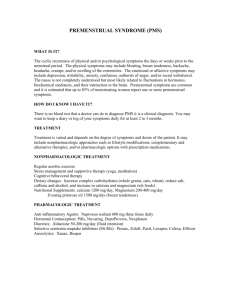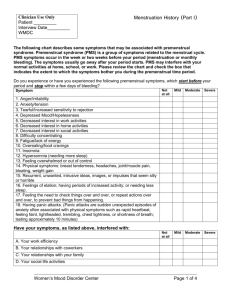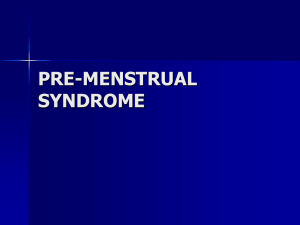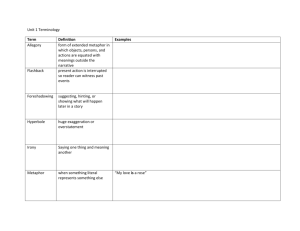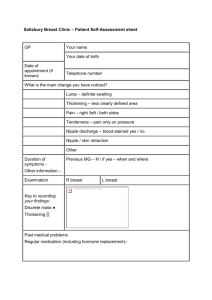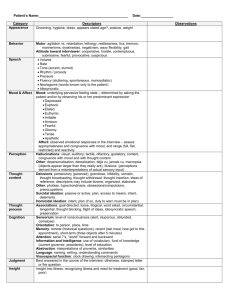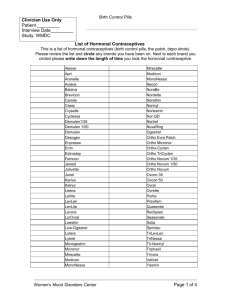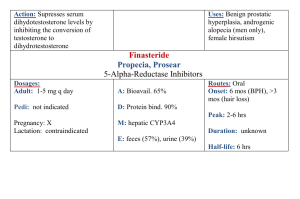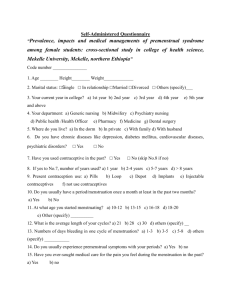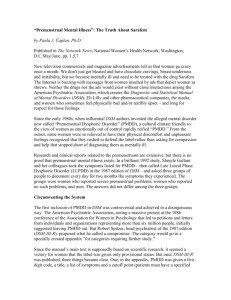PMS-Premenstrual syndrome
advertisement
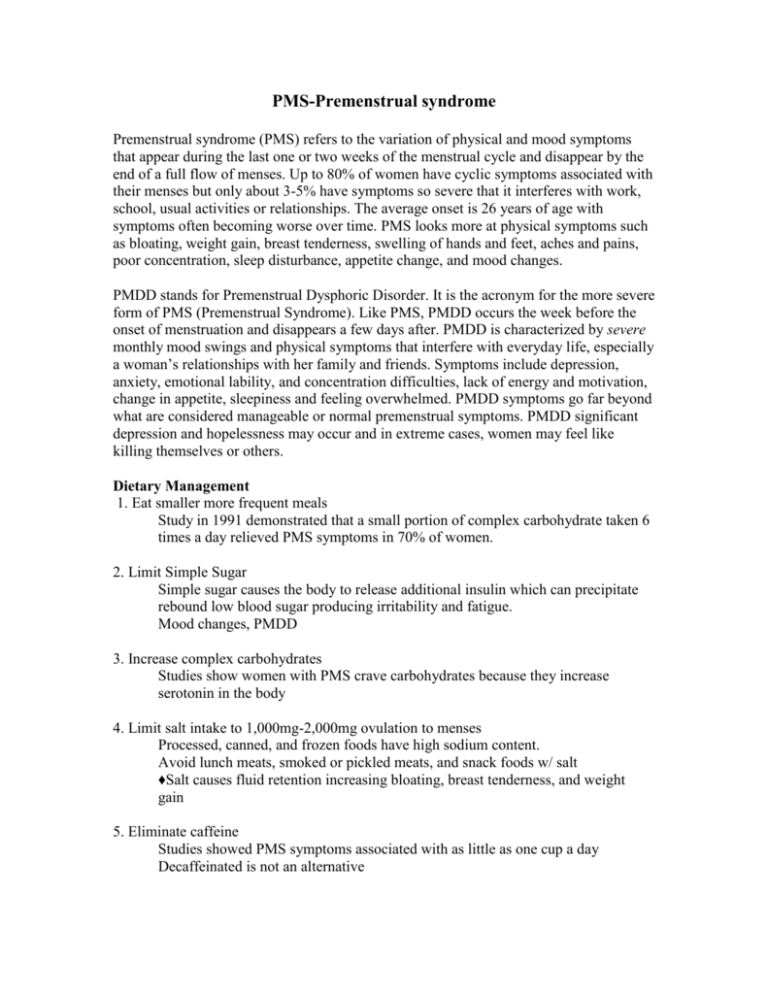
PMS-Premenstrual syndrome Premenstrual syndrome (PMS) refers to the variation of physical and mood symptoms that appear during the last one or two weeks of the menstrual cycle and disappear by the end of a full flow of menses. Up to 80% of women have cyclic symptoms associated with their menses but only about 3-5% have symptoms so severe that it interferes with work, school, usual activities or relationships. The average onset is 26 years of age with symptoms often becoming worse over time. PMS looks more at physical symptoms such as bloating, weight gain, breast tenderness, swelling of hands and feet, aches and pains, poor concentration, sleep disturbance, appetite change, and mood changes. PMDD stands for Premenstrual Dysphoric Disorder. It is the acronym for the more severe form of PMS (Premenstrual Syndrome). Like PMS, PMDD occurs the week before the onset of menstruation and disappears a few days after. PMDD is characterized by severe monthly mood swings and physical symptoms that interfere with everyday life, especially a woman’s relationships with her family and friends. Symptoms include depression, anxiety, emotional lability, and concentration difficulties, lack of energy and motivation, change in appetite, sleepiness and feeling overwhelmed. PMDD symptoms go far beyond what are considered manageable or normal premenstrual symptoms. PMDD significant depression and hopelessness may occur and in extreme cases, women may feel like killing themselves or others. Dietary Management 1. Eat smaller more frequent meals Study in 1991 demonstrated that a small portion of complex carbohydrate taken 6 times a day relieved PMS symptoms in 70% of women. 2. Limit Simple Sugar Simple sugar causes the body to release additional insulin which can precipitate rebound low blood sugar producing irritability and fatigue. Mood changes, PMDD 3. Increase complex carbohydrates Studies show women with PMS crave carbohydrates because they increase serotonin in the body 4. Limit salt intake to 1,000mg-2,000mg ovulation to menses Processed, canned, and frozen foods have high sodium content. Avoid lunch meats, smoked or pickled meats, and snack foods w/ salt ♦Salt causes fluid retention increasing bloating, breast tenderness, and weight gain 5. Eliminate caffeine Studies showed PMS symptoms associated with as little as one cup a day Decaffeinated is not an alternative 6. Avoid Alcohol Mood swings and irritability Source of sugar Exercise As little as 30 minutes three times a week of aerobic activity can improve mood less irritability and increase tolerance to stress. Exercise can decrease aches and pains, reduce fluid retention and breast tenderness. Exercise increases the body’s production of endorphins which relieve mild depression. Lifestyle management Balance physical, mental, emotional and spiritual self Stress accentuates PMS symptoms Reminders ♦Schedule demanding tasks during non-pms times ♦Say ‘NO’ to additional tasks and responsibilities ♦ Use relaxation techniques ♦ Mood is affected by everything we do including food choices, exercise, relationships, ♦ Balance self time with work and others……. ♦ Use counseling or other spiritual/emotional support to complement supportive therapies ♦ Nutrition, exercise, herbs, supplements, medications, and hormones are supportive Botanicals-usually taken from day 16 of cycle to menses 1. Chaste tree berry (Vitex) 0.5%aucubin extract 100-200mg/day Studies showed an improvement in mood swings, headaches, bloating and breast tenderness. Progesteronic herb b/c it increases luteinizing hormone production and inhibit the release prolactin causing a release of progesterone. No drug-herb interactions 2. Dong Quai (Angelica) 200mg/day Contraindicated during pregnancy and if taking a blood thinner like coumadin. Questionable in breast cancer Balances the reproductive hormonal system, anti-spasmotic, improves blood circulation to uterus and ovaries, diuretic so good for bloating and weight gain and breast tenderness. 3. Wild Yam (Dioscorea) 100-20mg/day Contraindicated in pregnancy Anti-spasmotic and calming to the nervous system. Good for nervousness ans restlessness. The human body does not create progesterone from wild yam. It contains diosgenin that is chemically manipulated in a lab to make progesterone, testosterone and estrogen. 4. Dandelion Leaf (Tartaxacum) 100-200mg/day Diuretic that is great for breast tenderness and bloating 5. Ashwaganda (Withania) 50-100mg/day Contraindicated in pregnancy Adaptogenic herb that is excellent for women with nervous exhaustion, stress, and mood changes. 6. St John’s Wort (Hypericum) 0.3% Hypericine 100-200mg/day Numerous Drug-Herb interactions, including OCP. Consult before taking. Excellent for depression and PMDD and mood changes including anxiety. Nutrients 1. Vit-E 2. Vit B-6 3. Magnesium 4. Calcium 5. Chromium 6. Borage oil 7. 5-HTP Depression, PMDD 400IU/day 50mg/day 200mg/day 200mg/day 200mcg/day 150mg/day 100mg before bed Breast tenderness Improved mood, increases Mg Deficient in PMS, muscle relaxant Deficient in PMS, water retention, mood Sugar cravings Cramps, breast tenderness Contraindicated with an SSRI Energetic medicine Homeopathy, Acupuncture, Reiki, Body work
